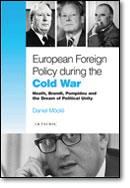European Foreign Policy During the Cold War

Heath, Brandt, Pompidou and the Dream of Political Unity
Author(s): Daniel Möckli
Publisher(s): I.B. Tauris
Publication Year: 2008
Publication Place: London
This book analyses the very beginnings of European Political Cooperation between 1969 and 1974. Europe's debut on the diplomatic stage was remarkably successful: By 1973, the EC countries were the single most effective actor group at the Conference on Security and Cooperation in Europe (CSCE), where they asked the Soviet Union to recognize human rights as a principle of European security. They also negotiated with the US on a reorganization of the West, became involved in the search for peace in the Middle East, and even discussed European defense cooperation. However, with the exception of the dominant European role at the CSCE, none of this proved sustainable. Europe's quest for a distinct foreign policy provoked a sharp US reaction, with the severe transatlantic crisis of 1973/74 bearing some striking similarities with the feud over Iraq in 2003. European diplomacy declined into crisis in 1974 and became a low-level phenomenon for the remainder of the Cold War. Based on recently released archival evidence from Britain, France, and Germany, the book examines why the EC-Nine were successful at joint diplomacy during the early 1970s, but still failed to establish Europe as an effective political power in the long run.
- call_madePublisher's Website
- call_madeBuy
